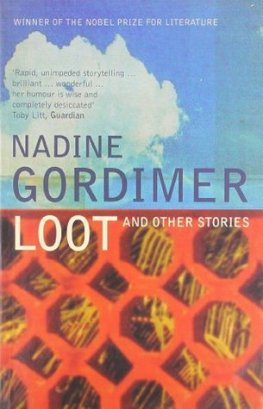Nadine Gordimer
Loot and Other Stories
Once upon our time, there was an earthquake: but this one is the most powerful ever recorded since the invention of the Richter scale made it possible for us to measure apocalyptic warnings.
It tipped a continental shelf. These tremblings often cause floods; this colossus did the reverse, drew back the ocean as a vast breath taken. The most secret level of our world lay revealed: the sea-bedded wrecked ships, facades of houses, ballroom candelabra, toilet bowl, pirate chest, TV screen, mail-coach, aircraft fuselage, cannon, marble torso, Kalashnikov, metal carapace of a tourist bus-load, baptismal font, automatic dishwasher, computer, swords sheathed in barnacles, coins turned to stone. The astounded gaze raced among these things; the population who had fled from their toppling houses to the maritime hills ran down. Where terrestrial crash and bellow had terrified them, there was naked silence. The saliva of the sea glistened upon these objects; it is given that time does not, never did, exist down here where the materiality of the past and the present as they lie has no chronological order, all is one, all is nothing or all is possessible at once.
People rushed to take; take, take. This was when, anytime, sometime valuable, that might be useful, what was this, well someone will know, that must have belonged to the rich, its mine now, if you dont grab whats over there someone else will, feet slipped and slithered on seaweed and sank in soggy sand, gasping sea-plants gaped at them, no-one remarked there were no fish, the living inhabitants of this unearth had been swept up and away with the water. The ordinary opportunity of looting shops which was routine to people during the political uprisings was no comparison. Orgiastic joy gave men, women and their children strength to heave out of the slime and sand what they did not know they wanted, quickened their staggering gait as they ranged, and this was more than profiting by happenstance, it was robbing the power of nature before which they had fled helpless. Take, take; while grabbing they were able to forget the wreck of their houses and the loss of time-bound possessions there. They had tattered the silence with their shouts to one another and under these cries like the cries of the absent seagulls they did not hear a distant approach of sound rising as a great wind does. And then the sea came back, engulfed them to add to its treasury.
That is what is known; in television coverage that really had nothing to show but the pewter skin of the depths, in radio interviews with those few infirm, timid or prudent who had not come down from the hills, and in newspaper accounts of bodies that for some reason the sea rejected, washed up down the coast somewhere.
But the writer knows something no-one else knows; the sea-change of the imagination.
Now listen, theres a man who has wanted a certain object (what) all his life. He has a lot of things some of which his eye falls upon often, so he must be fond of, some of which he doesnt notice, deliberately, that he probably shouldnt have acquired but cannot cast off, theres an art nouveau lamp he reads by, and above his bed-head a Japanese print, a Hokusai, The Great Wave, he doesnt really collect oriental stuff, although if it had been on the wall facing him it might have been more than part of the furnishings, its been out of sight behind his head for years. All these things but not the one.
Hes a retired man, long divorced, chosen an old but well-appointed villa in the maritime hills as the site from which to turn his back on the assault of the city. A woman from the village cooks and cleans and doesnt bother him with any other communication. It is a life blessedly freed of excitement, hes had enough of that kind of disturbance, pleasurable or not, but the sight from his lookout of what could never have happened, never ever have been vouchsafed, is a kind of command. He is one of those who are racing out over the glistening sea-bed, the past detritus=treasure, one and the same stripped bare.
Like all the other looters with whom he doesnt mix, has nothing in common, he races from object to object, turning over the shards of painted china, the sculptures created by destruction, abandonment and rust, the brine-vintaged wine casks, a plunged racing motorcycle, a dentists chair, his stride landing on disintegrated human ribs and metatarsals he does not identify. But unlike the others, he takes nothing until: there, ornate with tresses of orange-brown seaweed, stuck fast with nacreous shells and crenellations of red coral, is the object. (A mirror?) Its as if the impossible is true; he knew that was where it was, beneath the sea, thats why he didnt know what it was, could never find it before. It could be revealed only by something that had never happened, the greatest paroxysm of our earth ever measured on the Richter scale.
He takes it up, the object, the mirror, the sand pours off it, the water that was the only bright glance left to it streams from it, he is taking it back with him, taking possession at last.
And the great wave comes from behind his bed-head and takes him.
His name well-known in the former regime circles in the capital is not among the survivors. Along with him among the skeletons of the latest victims, with the ancient pirates and fishermen, there are those dropped from planes during the dictatorship so that with the accomplice of the sea they would never be found. Who recognized them, that day, where they lie?
No carnation or rose floats.
Full fathom five.
There was a great deal of entertaining up at the Managers house, weekends. On Monday morning a member of the kitchen and ground staff whose job it was set off to walk fifty miles to town with the masters note for the liquor store. A case of Scotch whisky. The man walked back with twelve bottles in the case on his head, arriving on Friday. Every Friday. The feat was a famous dinner-party story, each weekend: thats my man what heads they have, eh, thick as a log!
Roberta Blayne ne Cartwright works for an international aid agency, has been based both at headquarters in New York and Geneva, and posted abroad a number of times. Her first appointment to Africa came when she was nearly forty-six and felt she looked it; she had been married once, long ago it seemed to her. The journalist husband had fallen in love with a Chinese girl while on assignment in Beijing; the marriage was an intermittent one, so to speak, each of the pair generally somewhere else and it fell into desuetude amicably. He did not share her need to have some part in changing the world, which grew in inverse proportion to any other emotional need. There were no children as a reminder of the marriage; only the tragic-eyed swollen-bellied ones of the horde waiting, here, there, for succour through the bureaucratic processes she served. Not always, or often, the direct means of putting food in their gaped nestling-mouths, but projects of policy, infrastructure, communications, trade treaties, education, land distribution by which development aid was meant to satisfy all hungers.
Could have been India. Even the European countries brought to Third World conditions by civil wars. But it was Africa; a tour of duty, a territory in the process of transformation as in most others on the African continent. She unpacked at the type of house in the capital her aid agency hired for whatever personnel in middle-level position merited. The suburb must have dated from colonial times; verandah round three sides darkening rooms with fireplaces whose chimneys were now blocked by electric heaters, a garden where loquat and bougainvillaea, gnarled as old oak, tangled above stony red earth. The bedroom she chose there were three was obviously the best one, this confirmed by the aura of recent occupation by her predecessor and his or her bedmate, the hangers on the rods bearing the ghosts of clothes. Her own took their place; her papers and books spread where others had been cleared away. She was accustomed to this kind of takeover. Whatever lingering presence of others was quickly erased by hers. This was a confidence acquired by the nature of international work, routine as computer competency: you have to be in constant touch with headquarters, home base in New York or Geneva, and you occupy, where others were before you and will come after, designated quarters even though the black man who insists on waking you with tea every morning and polishes the floors, and the other who squats to tend weeds that have taken the place of flower-beds, enact old colonial rituals of a home.















